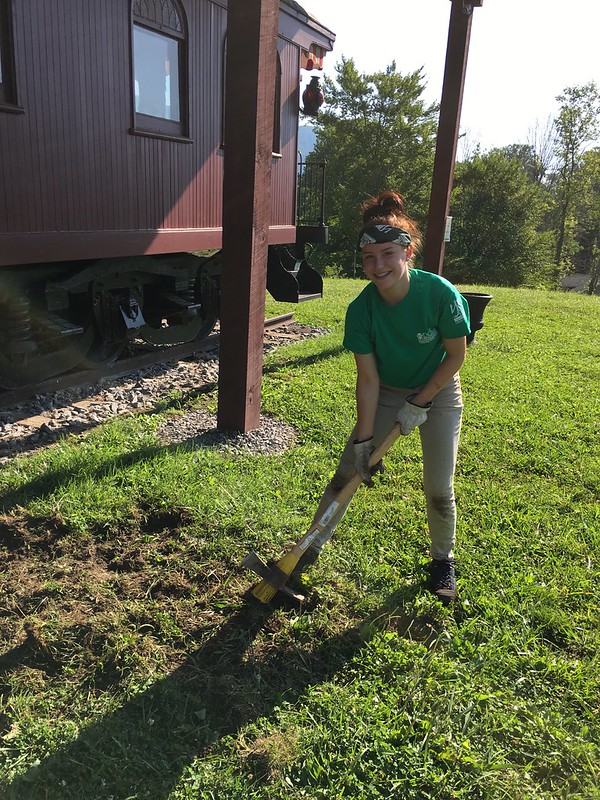Interpretive, Interpersonal, and Presentational Modes of Communication
Exploring Culture
The VHL Adventuras Supersite has helped me tremendously while I was a student in Spanish 101. I have learned common greetings, both verbal and non-verbal, in Latin cultures.
Untitled-documentUntitled-document-1
While I was learning more about this culture, I noticed differences and similarities between Latin culture and my own American culture. It is so important to be conscious about other peoples way of life. I have an apreciation for our differences and that’s what makes the United States the beautiful melting pot that it is known to be.
Engaging in Communities
It is SO important to engage in you community. I personally enjoy the outdoors and working with youth, and every summer for the past 3 years I have worked for Virginia State Parks as a Youth Conservation Corps Leader.

This opportunity has taught me core values such as: Strong work ethic, leading youth through positivity, and the importants of ecological conservation.
Interpersonal Communication
This semster, my professor assigned multiple small discussions for us to hold conversations with one another as classmates. These discussions and conversations were meant to show us how to casually speak to one another in the Spanish language.
Scanned-DocumentsI have learned so much about the mechanics of speaking and writing Spanish. For example, discussion boards helped me from the start, because I was able to post my answers to the class about myself and Latin culture in Spanish. My first discussion board post was a little nerve racking. I wasn’t sure what others would post and I was hoping I even did the assignment correctly. As the semester progressed, I was able to complete discussion boards with a lot more ease.
Presentational Speaking
N/A (we did not present in class)
Presentational Writing
There were two compositions assigned to us during my time in Spanish 101. The first composition was about our family. The second composition was about hobbies and sports at Old Dominion University.
Scanned-Documents-1Untitled-document-2
The compositions assigned were probably my favorite, due to the knowledge and understanding I gained from writing in depth about certain subjects. Writing about my family in the first composition was hard in the beginning, due to my lack of knowledge on spelling for certain words, and the correct verbage. Lucky, I received feedback on my mistakes and was able to correct them for the final copy. Once the second composition was due near the end of the semester, I used what I learned from the first writing comp and applied it.
Interpretive Listening
The VHL Adventuras Supersite has helped me tremendously while I was a student in Spanish 101. Included in the activities assigned, were some that had me listen to conversations and evaluate them.
ORIGINAL:
- Hola, Sandra. ¿Qué tal?
El gusto es mío. - Hasta luego, Sr. Lagos. Saludos a la Sra. Lagos.
Adiós. - Hasta mañana, Juan.
Nos vemos. - Antonio, éste es el Sr. Arce.
Igualmente. - ¡Hola, Norma! ¿Qué hay de nuevo?
Nada. - ¿De dónde es usted, señor?
Soy de México.
TRANSLATION:
1. Hello, Sandra. How are you? My pleasure.
2. See you later, Mr. Lagos. Greetings to Mrs. Lagos. Goodbye.
3. See you tomorrow, Juan. See you.
4. Antonio, this is Mr. Arce. Equally.
5. Hi Norma! What’s new? Nothing.
6. Where are you from, sir? I am from mexico.
One audio included on the VHL site was a conversation between multiple people. I was to decide if it was logical or illogical. This was not very challenging to me, because I like to hear Spanish being spoken and I was given the correct tools to break down the conversation and deide if what they were saying made sense (or didn’t). The listening portions of this website were very helpful, because I wanted to get more comfortable with auditory learning of the Spanish language.
Interpretive Reading
One assignment I completed was a short one giving the instructions: “For each person, provide the subject pronoun that you would use when addressing the person and the pronoun you would use when talking about the person.”
Untitled-document-3This activity was interesting to me. The basics of Spanish are very important (just as they are for any language), and to learn the correct use of pronouns depending on the structure and content of sentences is crucial. At first, I was having a little bit of a hard time when it came to using the right pronoun. For example instead of say “es amiga”, you would say “es mi amiga”.